Padang, Indonesia
MATUT HTI NA »
SEOUL, South Korea - Former South Korean President and Nobel Laureate Kim Dae-jung died of heart failure Tuesday, hospital officials said. He was 83. As president of South Korea, Kim Dai-jung helped bridge differences with North Korea. Kim -- who was president from 1998 to 2003 -- won the 2000 Nobel Peace Prize for fostering better relations between North and South Korea.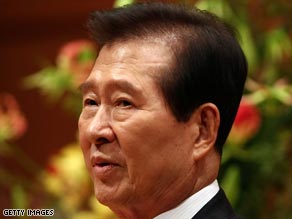
![]()
 |
| Policemen work at the site of explosion in a police compound in Nazran, 17 Aug 2009 |
SHIAO LIN, Taiwan - The number of people killed in Taiwan by Typhoon Morakot, a destructive storm that swept through East Asia last week, could triple because hundreds of people are feared trapped under mudslides, the president's office said Friday. Luo Shou Luan (left) is comforted as she looks at what is left of her home village, Shiao Lin. The official toll from the typhoon was 118 but could jump to more than 300, with as many as 200 feared buried under five stories of mud in the badly-hit village of Shiao Lin, presidential spokesman Wang Yuchi said. Rescuers were on Friday trying to determine if the mud was stable enough to bring in excavators to begin searching for bodies. Since the typhoon made landfall over the weekend, more than 31,000 people have been pulled from villages inundated by mudslides and floodwaters, according to official government figures. But in remote mountainous areas of Kaohsiung County, where Shiao Lin is located, rescue efforts have been hampered by torrential downpours, dense fog, rugged terrain and raging rivers. Washed out roads and bridges rendered ground rescue operations virtually impossible in the central and southern regions of the island, the National Disaster Prevention and Protection Commission said. Typhoon Morakot dropped about three meters (118 inches) of rain on southern and central parts of this island last week. After hitting Taiwan, it roared on to mainland China, killing at least six people and displacing 1.4 million, authorities said. The typhoon has prompted and international aid effort, with more than 30 countries offering money, helicopters, medication or other supplies. Officials from Hong Kong said they would recommend sending H.K. $50 million (U.S. $6.45 million) in aid. The aid request needed to get final authorization. The U.S. military expects a request from Taiwan soon for humanitarian assistance to cope with the aftermath of Typhoon Morakot, and is ready to send troops, equipment and supplies, several military sources told CNN on Friday. Taiwanese President Ma Ying toured the Jiadong and Linbian townships in Pingtung County Thursday, then visited Kaohsiung County, where a wall of mud had cut off Shiao Lin. Survivor Chen Chiu Lian, 76, told how she and her grandson swam for their lives when the storm hit Shiao Lin, destroying all but their home. She said: "I had just finished eating. My grandson was taking a nap. It rained and rained. There was water to my left and to my right ... The next day, it was still raining. "Our house was like a boat. The water was like an ocean. How can you escape? There was no way to escape.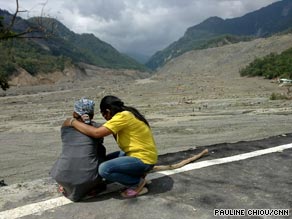
![]()
The fringes of Typhoon Morakot killed 10 people and injured 18 others in the Philippines, a spokeswoman for the National Disaster Coordinating Council told CNN. Three French tourists died when their vehicle was swept into the water; two local tourist guides also died when they tried to rescue them, she said. Heavy rain triggered at least 10 landslides, one of which destroyed a school, the spokeswoman said, adding that 23 structures were destroyed and six were damaged. The Philippines was expected to clear up late Saturday morning, said CNN Meteorologist Kevin Corriveau. In Taiwan, two people died and people were missing, according to local media. The storm was dropping massive amounts of rain in Taiwan as well, despite being downgraded to tropical storm strength by Saturday morning, Corriveau said. Some places in central and southern parts of the island saw nearly 1.3 meters (51 inches) of rain, and another meter (39 inches) were expected, he added. Journalist Andrew Lee in Taipei, citing local media, said the storm had blown off roofs and washed out some bridges. The storm made landfall carrying winds of up to 92 mph (148 kph), with gusts up to 115 mph (185 kph), the Joint Typhoon Warning Center said. The area has been severely affected by drought in recent months, leaving the ground so hard that it does not absorb the rainfall, Corriveau said. Taiwan's Central News Agency, acknowledging the drought, cited the Water Resources Agency as saying the storm had replenished the island's reservoirs and would put an end to water rationing in several areas. The storm prompted airlines to cancel flights. Schools and government offices were closed ahead of Morakot's arrival, according to Taiwan's Central News Agency. Trading at the Taiwan Stock Exchange was also postponed until Monday, the news agency reported. In China, state-run Xinhua News Agency reported that governments in coastal provinces were readying themselves for the storm and had ordered fishing boats to seek shelter before Thursday night. In Fujian province, about 8.4 million text messages had been sent to citizens warning them to prepare for the typhoon, Xinhua reported.
Former President Clinton met with North Korean leader Kim Jong Il on Tuesday in North Korea, according to South Korea's Yonhap News Agency, citing North Korean state-run media reports. Clinton is in Pyongyang trying to negotiate the release of two American journalists, according to the White House. Clinton landed in North Korea early Tuesday on a mission to negotiate the release of the journalists who have been imprisoned there since March. White House spokesman Robert Gibbs gave little detail on Clinton's itinerary. "While this solely private mission to secure the release of two Americans is on the ground, we will have no comment," Gibbs said. "We do not want to jeopardize the success of former President Clinton's mission." The North Korean news agency KCNA did not disclose the purpose of the visit in its three-line dispatch. However a source with detailed knowledge of Clinton's movements told CNN late Monday that he was going to seek the release of Laura Ling and Euna Lee, both reporters for California-based Current TV, a media venture launched by Clinton's Vice President Al Gore. Yang Hyong Sop, the vice president of North Korea's Supreme People's Assembly, and Kim Kye Gwan, the vice foreign minister, met Clinton, KCNA reported. Lee and Ling were arrested while reporting on the border between North Korea and China and sentenced in June to 12 years in prison on charges of entering the country illegally to conduct a smear campaign. Since the United States has no diplomatic relations with North Korea, efforts to resolve the issue have been handled through Sweden, which represents U.S. interests in the reclusive communist state. Last month Secretary of State Hillary Clinton said the Obama administration had dropped its request for Ling and Lee to be released on humanitarian grounds and instead was seeking amnesty, which implies forgiveness for an offense. This change in language is an important distinction that could move North Korea to release the women without feeling that its legal system has been slighted, analyst Mike Chinoy said. "I suspect that it was made pretty clear in advance that Bill Clinton would be able to return with these two women; otherwise it would be a terrible loss of face for him," said Chinoy, an Edgerton senior fellow on Asia at the Pacific Council on International Policy in Los Angeles, California. "The bigger, broader and more important question is what else could be on the agenda. Will Clinton be carrying a letter from Barack Obama for the North Korean leader Kim Jong Il? Will he meet Kim Jong Il?" Clinton's mission comes as the United States and its allies in the region are trying to push North Koreaback into stalled nuclear disarmament talks. North Korea conducted its second nuclear bomb test in May and has conducted several missile tests since then. The United Nations responded by tightening and expanding sanctions. The two nations were on opposite sides in the 1950-1953 Korean War and had no regular contacts before a 1994 crisis over North Korea's nuclear program. North Korea agreed at that time to halt the development of nuclear weapons, but abandoned that accord and withdrew from the Nuclear Non-Proliferation Treaty in 2003. Clinton had considered visiting North Korea in 2000 near the end of his second term as president. His secretary of state, Madeleine Albright, had gone to Pyongyang in early 2000 to meet with Kim, now widely reported to be ill.
North Korea's official news agency says former U.S. President Bill Clinton has arrived in Pyongyang, on an apparent mission to negotiate the release of two detained American journalists.
Former US President Bill Clinton (file photo)
The Korean Central News Agency says Mr. Clinton was greeted at the airport Tuesday by the vice-president of North Korea's parliament and the regime's chief nuclear negotiator, Kim Kye Kwan.
American journalists Euna Lee and Laura Ling have been held in North Korea since March for illegally crossing into North Korea over the Chinese border. They were arrested while reporting on North Korean refugees in China, near the North Korean border.
Lee and Ling were sentenced in June to 12 years of hard labor. They also were charged with committing hostile acts against the North Korean government.
The two women were reporting for San Francisco-based television news outlet Current TV, co-founded by Al Gore, Mr. Clinton's former vice president.
These undated photo show American journalists Laura Ling, right, and Euna Lee (File)
The Obama administration had initially proposed sending Gore to Pyongyang to negotiate for the journalists' release, but the proposal was rejected by the regime.
Mr. Clinton is the highest-profile American to visit North Korea since Madeline Albright, his former secretary of state, who traveled there in 2000.
U.S. Secretary of State Hillary Clinton, the former president's wife, has urged Pyongyang to grant amnesty to Lee and Ling.
Relations between the U.S. and North Korea have worsened in recent months over Pyongyang's nuclear test in May, and a series of subsequent test-firings of long and short-range missiles. The nuclear test led to a U.N. resolution imposing a new series of tougher sanctions against the regime.
BEIJING, China -Hundreds of people have been detained in connection with ethnic riots in the northwest last month, China's state-run Xinhua news agency reported Sunday. Chinese paramilitary militia chant patriotic slogans during a troop review in Urumqi, China, on July 28. Police in Urumqi, the capital of China's remote northwestern Xinjiang Autonomous Region, said they had detained 319 people in connection with the July 5 riots, according to Xinhua. The detentions came in addition to the 253 detentions announced on July 29, the news agency said. Before that, more than 1,000 suspects had been detained, Xinhua said. It was unclear, however, how many of the detainees had been released, and a police spokesman would not divulge further details, the news agency reported. The latest 319 people were detained after information was received from the public or obtained through the police investigation, the Urumqi Public Security Bureau said, Xinhua reported. The suspects were arrested in Urumqi and other parts of Xinjiang. Reports vary on the number of people killed in the ethnic riots, ranging from around 200 to many more. Problems in the region began in late June, after two Uyghur migrant workers at a toy factory in Guangdong province were killed after a brawl between Uyghurs and ethnic Han Chinese -- the majority group in China. Uyghurs protested in Urumqi, hundreds of miles from the toy factory. Uyghurs and Han reportedly attacked each other. 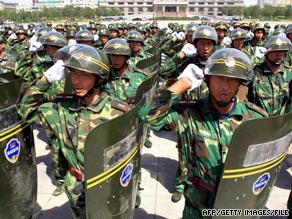
![]()
Former Philippine President Corazon Aquino, whose "People Power" movement pushed out longtime strongman Ferdinand Marcos less than three years after her husband's assassination, has died at age 76, her family announced Saturday. Aquino, the first woman to lead the Philippines, had been battling colon cancer since March 2008 and died of cardio-respiratory arrest at 3:18 a.m. Saturday (3:18 p.m. Friday ET), said Mai Mislang, a spokeswoman for her son, Philippine Sen. Benigno Aquino III. Funeral arrangements were being set up, Mislang said. Philippine President Gloria Macapagal Arroyo has also announced a 10-day mourning period for the former president, said Ray Donato, the country's consul-general in Atlanta. "She was the agent of change in Philippine democracy, and almost all the Filipinos I know revered her during her presidency," Donato said. Aquino had been born into a wealthy family and was educated in the United States. She had not been involved in politics before her husband, opposition leader Benigno "Ninoy" Aquino Jr., was gunned down at Manila's airport in August 1983 as he returned from exile. The political novice took over the leadership of her husband's movement after his death and challenged Marcos in a 1986 election, making a yellow dress her trademark and bolstered by the support of the country's Roman Catholic churches. Marcos had been backed by the United States, the former colonial power in the Philippines, for two decades as a stalwart anti-communist. He and his wife Imelda were friends of then-President Ronald Reagan and his wife, Nancy. But widespread allegations of electoral fraud and a mutiny by the country's military led the Reagan administration to withdraw its support, and Marcos went into exile in Hawaii. Aquino took office in a country with a $28 billion debt, widespread poverty and a persistent Marxist insurgency. She put in place a U.S.-style constitution that limited presidents to a single six-year term and survived seven coup attempts -- including one that was supressed with American help. She also oversaw the closure of the major U.S. military bases in the country before leaving office in 1992. The bases had been a bulwark of American power in the Pacific since the early 1900s and employed nearly 80,000 Filipinos, but Aquino's opponents argued the country was too dependent on the United States. Aquino announced in 1990 that it was time to begin negotiating the "orderly withdrawal" of U.S.
KUALA LUMPUR, Malaysia - Police fired tear gas and water cannons and arrested 157 people to quell a protest Saturday against a colonial-era detention law.
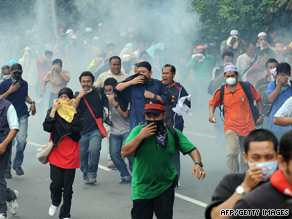
ISLAMABAD, Pakistan - Six people were killed in Pakistan on Saturday when Muslim demonstrators set fire to houses in a Christian enclave and fighting broke out, local police said. Pakistani human rights activists in Lahore protest on Saturday the anti-Christian violence in Gojra village. Police said Muslims were enraged over an alleged desecration of pages in the Quran at a Christian wedding last Saturday, and held a rally to protest. The Quran is the Muslim sacred text. The Muslims went to the Christian community in Gojra City, 160 kilometers (100 miles) southwest of Lahore, and burned 40 to 50 houses. Muslims and Christians exchanged gunfire. Police said efforts to settle the concerns with dialogue so far have failed. On Thursday, 15 Christian houses in the region were also torched. Pakistan is predominantly Muslim but has a small Christian community. Meanwhile, police in Islamabad reported Friday that an al Qaeda member thought to be involved in several attacks was arrested. Bin Yamin, a senior police official in Islamabad, identified the suspect as Rao Shakir Ali. Police believe he was involved in strikes on targets such as the Danish Embassy, a rally of Chief Justice Iftikhar Chauhdary, police, and a hotel. The suspect is a resident of Sargodha, which is 165 kilometers (about 100 miles) northwest of Lahore and has a house in Rawalpindi that has been used to facilitate insurgent acts, police said. 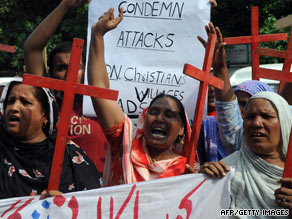
![]()
An unprecedented two-day dialogue of top U.S. and Chinese officials ended in Washington Tuesday with pledges by the two governments to work more closely together on political, economic and environmental issues. Secretary of State Hillary Clinton said China shares U.S. concerns about the prospect of a nuclear-armed Iran.
U.S. Secretary of State Hillary Clinton (r) and China's State Councilor Dai Bingguo at the State Department in Washington, 28 Jul 2009
The meeting, bringing together Secretary of State Hillary Clinton, Treasury Secretary Timothy Geithner and their Chinese counterparts was dominated by the economic track, and the need for the two powers to coordinate efforts to overcome the global economic crisis and restore stability.
But Clinton, at a closing news conference, said she and Chinese State Councilor Dai Bingguo, the Beijing government's ranking foreign affairs adviser, covered shared concerns about the North Korean and Iranian nuclear programs and that China is no less troubled than the United States about the prospect of a nuclear-armed Iran.
"China shares our concerns about Iran becoming a nuclear weapons state," said Hillary Clinton. "The potential for de-stabilizing the Middle East and Gulf is viewed similarly by the Chinese as it is by us, if Iran, in its pursuit, triggers an arms race And we had some very useful exchanges of information there."
On the economic side, Treasury Secretary Geithner said his Chinese interlocutor - Vice Premier Wang Qishan - promised that Beijing would step up domestic economic demand so that its recovery from the global downturn would be less dependent on exports - to the United States and elsewhere.
He said the United States, in turn, would move to assuage Chinese concerns by reducing its huge budget deficits as soon as economic conditions permit, to help shore up the dollar and protect the value of China's vast investments in the United States.
"As we move to raise private savings in the United States, as we move to bring down our fiscal deficit in the future, as we move to put in place a more stable, more resilient financial system in the United States, we need to see actions in China, and other countries, to shift the source of growth to domestic demand," said Timothy Geithner. "Those are necessary complements. They have to work together. And I think that's the most important strategic achievement here."
Treasury chief Geithner and Vice Premier Wang said the two countries would maintain economic stimulus efforts until recovery becomes evident. They gave no specifics about how the two governments intend to meet their commitments to rebalance their economies after recovery, and also avoided mention of sharp differences over currency valuations.
But earlier Tuesday, Vice Premier Wang warned the Obama administration against letting the dollar's value slide too far - saying that as a major reserve-currency nation, the United States should properly balance and properly handle the impact of the dollar supply on the world economy.
China, running huge surpluses in trade with the United States, is the largest single investor in U.S. Treasury bonds -more than $1 trillion worth. U.S. officials have said the trade imbalance is partly due to an artificially low valuation of China's currency, though Geithner avoided mention of that Tuesday.
The two sides signed a memorandum of understanding to boost cooperation on combating climate change, and pledged their support for free trade and a successful conclusion of the Doha round of world trade negotiations.
Chinese State Councilor Dai said the dialogue, and the China trip planned by President Obama later this year, will be seen in retrospect as historic milestones in the bilateral relationship.
The alleged gunman captured alive during last year's Mumbai terror attacks told an Indian court Wednesday that he was ready to face execution. Mumbai's Taj Mahal hotel burns during last November's attack by gunmen. But prosecutors who are trying Mohammed Ajmal Kasab on 86 charges -- including waging war against India -- said they will hold off on recommending a sentence because Kasab has yet to disclose more. Special public prosecutor Ujjwal Nikam said Kasab had downplayed his alleged role in the Mumbai attacks to a minimum. Kasab told the court that he had been under no pressure to plead guilty, according to Nikam. "He (Kasab) wanted to save his skin and that of his colleagues in Pakistan," the prosecutor argued. The case, Nikam said, had "international ramifications" and was not just limited to the lone suspect. Abbas Kazmi, Kasab's defense attorney, said that he had told the court it could accept his client's confessional statement and end the trial if it wanted to. There was no attempt on the defense part to delay the trial, he insisted. Kasab is one of 10 Pakistani nationals who police said unleashed terror on India's financial capital for four days and three nights, beginning November 26. The other suspects were killed during the attacks. Police said the gunmen killed more than 160 people, including many foreigners, as they laid siege on buildings such as the Taj Mahal Palace and Tower and Oberoi-Trident hotels, Mumbai's historic Victoria Terminus train station and the Jewish cultural center, Chabad House. Authorities said Kasab, 21, was trained by Lashkar-e-Tayyiba, a militant group which was banned in Pakistan in 2002 after an attack on India's parliament. The group denied responsibility. Kasab's confession Monday caught prosecutors by surprise. The trial had been underway for two weeks, and the court had heard from 134 of 150 witnesses. Admitting his role in the carnage, Kasab said Zaki-ur-Rehman Lakhvi of Lashkar-e-Tayyiba had been involved in plotting the attacks. Lakhvi, Lashkar-e-Tayyiba's operational chief, was arrested in raids by Pakistani security forces in December last year, shortly after the Mumbai attacks. In a statement issued at the time, the U.S. government said Lakhvi had directed Lashkar-e-Tayyiba's military operations in southeast Asia, Chechnya, Bosnia and Iraq. "Lakhvi instructed LeT associates in 2006 to train operatives for suicide bombings," according to a U.S. government statement. "Prior to that, Lakhvi instructed LeT operatives to conduct attacks in well-populated areas."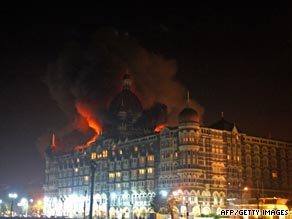
![]()
Don't Miss
Authorities in Indonesia released sketches Wednesday of two men believed to have carried out last week's bombings at two luxury hotels in Jakarta. Indonesian police spokesman Nanan Sukarna shows a sketch of the suicide bombers in Jakarta on Wednesday. One was about 40; the other 17, officials said. Analysis of their DNA matched that obtained from a homemade explosive found in a room at the Marriott Hotel where they had checked in, police said. But authorities still do not know their identities. The blasts last Friday at the Ritz Carlton and JW Marriott killed nine people -- including at least two presumed suicide bombers -- and wounded more than 50. The bombings happened shortly before 8 a.m. (9 p.m. ET). Both blasts struck the hotels' restaurants and several prominent international business leaders were among the casualties. Carlton is a subsidiary of Marriott. 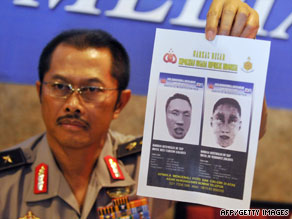
![]()
China acknowledged Sunday that security forces shot dead 12 people during ethnic riots in the northwest earlier this month. Police patrol Urumqi, China, on Saturday, July 11. Officials also said Sunday that the death toll from the violence in the Xinjiang region had risen to 197. The government had previously said the fighting killed at least 184 people and wounded more than 1,000. Nur Bekri, chairman of the Xianjiang regional government, said police officers in the capital Urumqi shot 12 "mobsters" after failing to deter them by firing into the air, state-run media said. Three of them died on the spot, while nine died later, the Xinhua news agency said. He did not say whether the "mobsters" were Uyghurs, who are predominantly Muslim, or Han, who are the majority in China. The rioting stemmed from an incident in June when a brawl broke out between Uyghur and Han workers at a toy factory in Guangdong province in southern China. Two Uyghurs reportedly died. To protest the deaths, Uyghurs took to the streets in Urumqi -- and fighting erupted. "But we could never imagine that the mobsters were so extremely vicious and inhumane," Bekri said, adding that the "thugs" used iron rods, stones and bricks to kill innocent residents. The Xinjiang Uyghur Autonomous Region is home to about 20 million people and 13 major ethnic groups -- of which the Uyghur is the largest. Some Uyghurs resent the presence of Han in Xinjiang, many of whom came looking for work. A militant leader whose group has links to al Qaeda has denounced Chinese treatment of Uyghur Muslims and threatened to seek "revenge." The leader of the Turkistan Islamic Party, in a video that appeared on Islamic Web sites, blames the Chinese for "genocide" against people in East Turkistan -- what some Uyghurs calls the region of Xinjiang province in western China where they live. The remarks were delivered by Seyfullah, commander of the Turkistan Islamic Party and dated July 8. They came after the violence erupted between Uyghur Muslims and Han Chinese. The speaker urged his people to "kill the Chinese Communists where you find them, take them and besiege them and ambush them wherever you can." "Let them know that these Muslim people have men who will seek their revenge and they are about to do that very soon, before the horses of God will reach you, God willing, so be prepared for that moment because we are too getting prepared."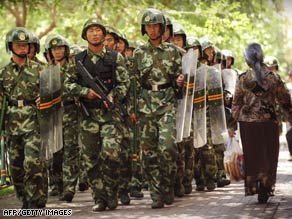
![]()
Indonesian officials say there are "strong indications" a key wanted fugitive was behind Friday's deadly attacks on two hotels in Jakarta. Noordin Mohamed Top is wanted for plotting the Bali bombings of 2002 and 2005 and other Indonesian attacks. Nine people, including two suicide bombers, died in the attacks on the Ritz-Carlton and JW Marriott. At least four of Friday's victims are said to be foreigners but have not all been formally identified. Police in the Indonesian capital are studying DNA and other evidence to try to identify those behind the attacks. The anti-terror chief, Ansyaad Mbai, has told the BBC he believes there are strong indications that Noordin was the mastermind behind the blasts. Noordin was said to be a key financier for the Jemaah Islamiah militant group but is now thought to have set up his own splinter group. Jemaah Islamiah has links to al-Qaeda and has a long track record of bomb attacks in Indonesia including the 2002 Bali bombings, which killed more than 200 people. Friday's bombs contained nails, ball bearings and bolts, identical to ones used by Jemaah Islamiah, police said. Mr Mbai said he believed the aim of the attacks was to embarrass Indonesia's government at a time when the country was enjoying a greater degree of stability than it had in the past. The BBC's Karishma Vaswani in Jakarta says the Indonesian people have been truly shocked by these attacks as they thought they had put events like this behind them. Investigators on Friday recovered an unexploded bomb and other explosives material from what they said was the "control centre" for the attacks - room 1808 in the Marriott. The attackers paid to stay at the hotel and smuggled in the explosives before detonating them in two restaurants on Friday. CCTV footage showed one attacker wearing a cap pulling a bag on wheels into the Marriott restaurant, followed by a flash and smoke. Security has been tightened across Indonesia in the wake of the attacks, with 500 troops put on standby to support police in the capital. 'Shoulder to shoulder' A New Zealander, businessman Tim Mackay, has been confirmed killed. Indonesian police say Australians Nathan Verity and Garth McEvoy also died. Their countryman, diplomat Craig Senger, was at the same breakfast meeting. He is missing and feared dead. A health ministry report said a Singaporean and an Indonesian were also confirmed dead. At least 17 foreigners were among the wounded, including eight Americans. Other foreign nationals wounded included visitors from Australia, Canada, Hong Kong, India, Italy, the Netherlands, Norway, South Korea and the UK. President Susilo Bambang Yudhoyono condemned the attacks as "cruel and inhuman". US President Barack Obama said: "I strongly condemn the attacks that occurred... in Jakarta and extend my deepest condolences to all of the victims and their loved ones." Australian Foreign Minister Stephen Smith is due to arrive in Jakarta on Saturday. He said he wanted to stand "shoulder to shoulder with Indonesia at this terrible time". The Manchester United football team had been booked to stay in the Ritz-Carlton next week ahead of a game in Jakarta. The team has cancelled the Indonesian leg of their tour. The attacks come just weeks after the peaceful presidential elections. The country of 240 million people has been praised in recent years for maintaining a pluralist democracy while finding and punishing radical Islamists responsible for the series of bombings more than five years ago.
![]()

![]()
![]()
![]() I strongly condemn the attacks that occurred... in Jakarta and extend my deepest condolences to all of the victims and their loved ones
I strongly condemn the attacks that occurred... in Jakarta and extend my deepest condolences to all of the victims and their loved ones ![]()
![]()